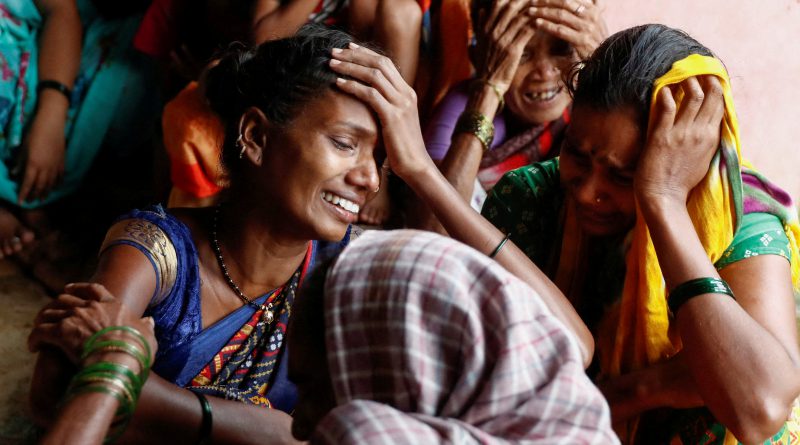Indian landslide kills 16, rescue operations paused
Irshalwadi (Reuters) – The death toll from a massive landslide in western India rose to 16 late on Thursday, as rescue operations were suspended with around 100 people still feared trapped, officials said.
Land gave way in the middle of the night in the remote mountain hamlet of Irshalwadi, in the state of Maharashtra, about 60 km (37 miles) from Mumbai, flattening several houses and trapping many who lived there.
A wave of extreme heat, wildfires, torrential rain and flooding has wreaked havoc around the world in recent days, raising new fears about the pace of climate change.
Rescue workers recovered 16 bodies before night fell and local authorities advised they suspend the search, Director General of the National Disaster Response Force (NDRF), Atul Karwal, told Reuters.
“It is not possible to look for people in the dark in such terrain,” he said, adding he remained hopeful more could be found alive.
Rescuers searched for over 12 hours in heavy rains and fog, dodging large boulders that tumbled down the mountain slope, a Reuters witness and local media reported.
Some dug graves near the site of the incident, as conditions made getting bodies down the mountain too difficult, the witness said.
It was estimated that at least 225 people lived in the hamlet, Devendra Fadnavis, Maharashtra’s deputy chief minister told the state assembly, adding over 80 had managed to escape. More than 100 people were feared trapped in the debris.
“The debris at some of the places is 10 to 29 feet deep,” S B Singh, an official with the NDRF, told the Indian Express newspaper.
More Rain Coming
A landslide in a nearby village killed more than 80 people two years ago. Disasters linked to rains have killed more than 100 people in India, mostly in the north, since the onset of the monsoon season on June 1, the India Meteorological Department said.
Some pockets of the district, dotted with old forts and laced with trekking trails, received as much as 400 mm rain in the last 24 hours, according to the weather department.
More rain was expected on Thursday but not as heavy, a weather department official said.
A red alert had been issued for the coast of Maharashtra and Gujarat state to the north, also battered by rains that have closed schools, flooded roads and disrupted transport.
This week, the Yamuna river reached the compound walls of the Taj Mahal for the first time in 45 years, submerging several historical monuments and gardens surrounding the 17th century, white-marble mausoleum.
A week earlier, in New Delhi, jammed flood gates and a broken drainage regulator saw water from the Yamuna flow into the city, inundating several areas, including around the historic Red Fort and Rajghat – a memorial dedicated to Mahatma Gandhi.



